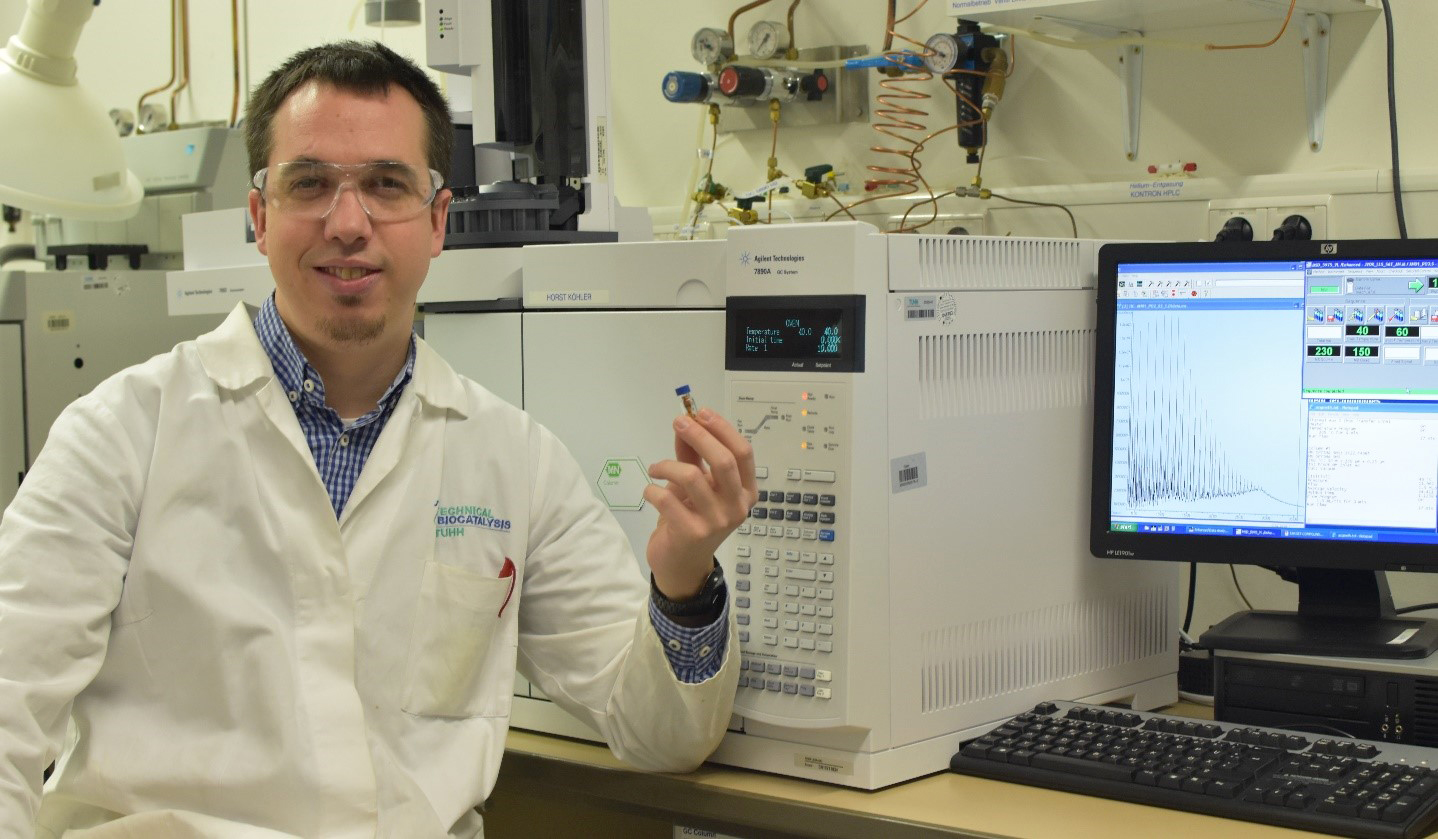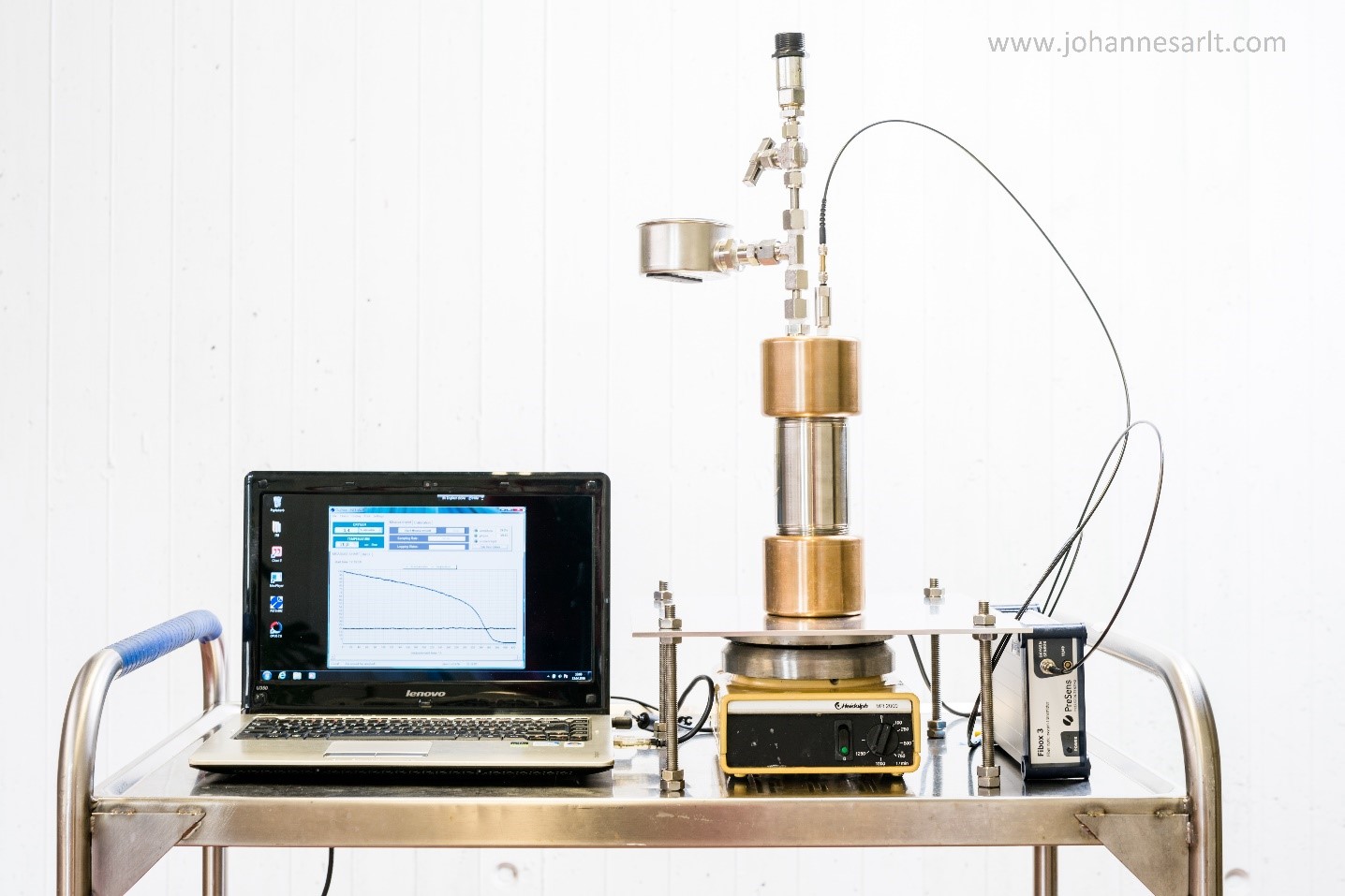
Juan Viamonte, Student of the Month, October 2016

Juan Viamonte, a PhD student in the Institute of Technical Biocatalysis at the Hamburg University of Technology (TUHH), studies microorganisms in extreme conditions. With jars of sediments from the Gulf’s floor shipped half-way around the world, Juan cultures the bacteria and repressurizes them to simulate the conditions at the bottom of the ocean. With these lab simulated conditions he is able to provide more accurate estimates of deep-sea biodegradation, important information when developing models during response efforts. The scope of Juans work makes him the C-IMAGE Student of the Month for October 2016.
What is the focus of your research? How will your findings contribute to the overall understanding of oil spills or oil spill response?
My research focus is evaluating how microorganisms can degrade Light Louisiana Sweet (LLS) oil when specific physicochemical conditions, similar to the ones surrounding the Deepwater Horizon (DWH) blowout, are simulated in the lab. With the help of high pressure reactor prototypes, biodegradation reactions are carried out at 150 bar and 4°C, assisted by bacterial communities present in the upper layer of sediments collected near the Macondo well by the C-IMAGE cruises.
Juan evaluates the limits and rates of the biodegredation process by measuring oxygen consumption and employing off-line GC-MS analyses. He does this for specific target hydrocarbons like toluene, ethylbenzene, and naphthalene. This is in close cooperation with my fellow PhD students Nuttapol Noirungsee (aka Ice) studying the effects of methane degradation and Steffen Hackbusch analyzing changes in microbial communities during biodegradation at high pressure conditions. The effect of the presence of dispersants is also analyzed as these components could impact the biodegradation process considerably.
Understanding how and to which extent crude oil is biodegraded under high pressure conditions is of crucial importance for the development of simulation models aimed to comprehend the fate of petroleum after the DWH spill. Additionally, the goal of my research investigates biodegradation beyond DWH conditions trying to set tools for the comprehension of possible future deep water crude oil spills. This is accomplished by increasing the capabilities of our high pressure reactor system up to 400 bar in order to simulate deeper sea conditions and by evaluating biodegradation extent on hydrocarbons from different crude oil types.

What path did you take to make it to where you are now? Bachelor’s degree, internship experience, working experience?
This is an interesting question and in order to start chronologically I will begin with my working experience which started when I was 16. Among the different roles I have performed, I moved from delivering pizzas with my scooter, working as a construction electrician, fixing vintage racing bicycles to being a sales commercial agent for nearly two years selling medical equipment to hospitals. At the age of 23 I realized that it was complicated to adequately combine my ongoing studies in pure Chemistry with full-time jobs and then I decided to start over. I focused on my academic career while tutoring science to high school students and I completed a Bachelor’s degree in Chemical Engineering with specialization in environmental technologies. My degree was carried out in my hometown, at the University of Zaragoza (Spain), performing the final Bachelor’s Thesis at the University of Southern Denmark.
After a great experience abroad and considering the adverse economic situation of my country, I decided to continue with my studies in Germany. Luckily, I was accepted at the Hamburg University of Technology (TUHH) where I finished a Master’s degree in Chemical and Bioprocess Engineering. During my Master I had the chance to work as a research assistant at the Institute of Technical Biocatalysis (ITB) and, furthermore, to perform my Master’s Thesis in an industrial environment working for Evonik Industries in the field of chemical reaction engineering. The following step in my career is happening now also at ITB, carrying out my doctoral studies evaluating the biodegradation of crude oil in deep sea conditions under Prof. Andreas Liese and the support of recently retired Prof. Rudolf Müller.
What initially interested you in working at the Institute of Technical Biocatalysis (ITB)?
As I commented in the previous question, when I started my Master’s degree at TUHH I had the chance to join the ITB team as a student research assistant (HiWi in German terminology). This gave me the opportunity to discover a great team working in different aspects of biocatalytic reactions. From bioplastic production to improvement of pharmaceutical compound syntheses, including the field of my interest involving high pressure biotechnology where I can study the importance of petroleomics for biodegradation processes.
What research tasks are you completing this week (or this month)?

Right now I am trying to improve the validity of the measurements obtained from our high pressure reactors. One important factor which affects biodegradation under high pressure conditions is the effect of decompression over the chemistry and the biology involved in the process. Crude oil is composed of thousands of hydrocarbon compounds and some of them present a high volatility. By determining how much of those hydrocarbons are lost during the decompression step, quantification of the effective biodegradation is improved, to yield a better comparison between different pressure conditions applied in the process.
The next step however will take a bit longer as I am starting to set-up the high pressure system to allow working with pressures up to 400 bar. Working under such conditions is a delicate operation and requires exhaustive planning and preparation to ensure the complete safety and functionality of the procedure.
Which of your findings or research has been most eye-opening? Were there any moments or facts that just made you say “Wow! I did not expect that.”?
As a chemical engineer, I am occasionally surprised by many aspects related with biology. But probably, the loudest “wow” happened when I got to know the first results of the C-Image I group working at ITB. Microorganisms degrading oil? I was expecting that. Doing it at 1500 m depth? Wow! Could this also happen even at higher pressures? We will find it out soon!


